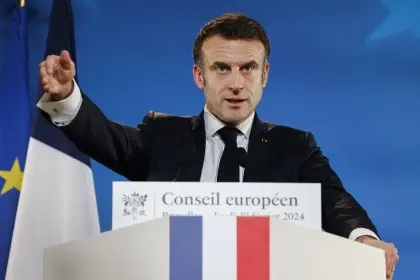French President Emanuel Macron has been attracting attention for his new-found belief that Paris should be playing a more aggressive, central role in achieving a Ukrainian victory. While his new stance has been cheered by Ukraine’s supporters, they were not well-received across the board.
In fact, Macron’s recent comments, regarding the possibility of sending Western troops to Ukraine, created a backlash among some NATO member states; and Russia’s spy chief, Sergey Naryshkin, went as far as to “announce” that there were plans to ship 2,000 French troops to Ukraine – something to which the French defense ministry coyly responded to as “disinformation.”
JOIN US ON TELEGRAM
Follow our coverage of the war on the @Kyivpost_official.
Undeterred, Macron has reiterated his position: Sending French troops to Ukraine, if needed, should not be ruled out. He also urged European leaders to not be weak in the face of the current “existential” war. Not limiting himself to Ukraine, Macron has also reiterated “unwavering support” for Ukraine’s neighbor, Moldova.
French politicians seem to comprehend that Russia’s war is about more than just Ukraine. The French parliament recently passed a security agreement, albeit largely symbolic, to support Ukraine. Reflecting broader French sentiment, rival politician Marine Le Pen, known for her Russian-friendly sentiments, stated that her parliamentary bloc would abstain from voting against the measure as a gesture of solidarity with Ukraine’s plight.

Ukraine Moves Forward with Draft Multiple Citizenship Law: Ukrainian World Congress Responds
However, not all French are as excited about Macron’s hawkish views. A poll, conducted by Odoxa, found that 68 percent of French citizens believed that Macron was “wrong” in his insistence that it might be necessary to deploy Western troops to Ukraine. Despite domestic criticism, Macron has vigorously declined to rule out Western troops in Ukraine.
Macron’s current tough talk on Russia marks a significant shift from his earlier promotion of engagement with Moscow, which saw the leader cultivating personal ties with Putin. Despite criticism at the time for his dovish strategy, Macron went so far as to argue that it was key to “not humiliate Russia so that the day when the fighting stops we can build an exit ramp through diplomatic means.”
Perhaps better late than never, Macron now recognizes that “if Russia were to win, the lives of French people would change,” adding: “We would no longer have security in Europe.”
On one hand, Macron’s change can be understood in the context of Paris’ perennial competition with Berlin, now under the leadership of Olaf Scholz, over whether France can lead Europe. Germany has held the leadership role for decades, so some have interpreted Macron’s remarks that Europeans cannot be “cowards” – specifically referencing skepticism about providing Ukraine with military aid in the past – as being a swipe at Scholz.
There are also legitimate good reasons for Macron to have developed a more proactive view towards regional conflict: France’s burgeoning arms industry is now the second largest in the world, creating 400,000 jobs in France, and has surpassed Russia as the second largest producer of armaments. Future European arms deals for Ukraine will continue to include large purchases from French suppliers.
Internationally, Russia has been curtailing the influence of France abroad, with the alleged involvement of Russian special services or Wagner in Francophone Africa. Additionally, in Latin America, Venezuela’s threats to roll into neighboring Guyana also alarm Macron as it neighbors France’s largest overseas department: French Guiana.
Macron, undoubtedly keeping an eye on his legacy before his second and final term expires in 2027, has turned out to be a wild card. Decisive steps now, to lead Europe against a revanchist Russia, will undoubtedly fuel how the history books remember his leadership.
The views expressed in this opinion article are the author’s and not necessarily those of Kyiv Post.
You can also highlight the text and press Ctrl + Enter






